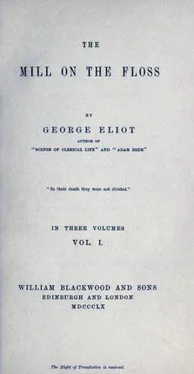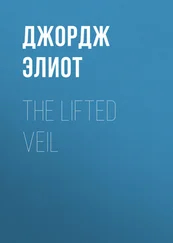Stephen turned away, and walked backward and forward at the other end of the room. There was the dire necessity of going back into the dancing-room again, and he was beginning to be conscious of that. They had been absent so short a time, that when he went in again the waltz was not ended.
Maggie, too, was not long before she re-entered. All the pride of her nature was stung into activity; the hateful weakness which had dragged her within reach of this wound to her self-respect had at least wrought its own cure. The thoughts and temptations of the last month should all be flung away into an unvisited chamber of memory. There was nothing to allure her now; duty would be easy, and all the old calm purposes would reign peacefully once more. She re-entered the drawing-room still with some excited brightness in her face, but with a sense of proud self-command that defied anything to agitate her. She refused to dance again, but she talked quite readily and calmly with every one who addressed her. And when they got home that night, she kissed Lucy with a free heart, almost exulting in this scorching moment, which had delivered her from the possibility of another word or look that would have the stamp of treachery toward that gentle, unsuspicious sister.
The next morning Maggie did not set off to Basset quite so soon as she had expected. Her mother was to accompany her in the carriage, and household business could not be dispatched hastily by Mrs. Tulliver. So Maggie, who had been in a hurry to prepare herself, had to sit waiting, equipped for the drive, in the garden. Lucy was busy in the house wrapping up some bazaar presents for the younger ones at Basset, and when there was a loud ring at the door-bell, Maggie felt some alarm lest Lucy should bring out Stephen to her; it was sure to be Stephen.
But presently the visitor came out into the garden alone, and seated himself by her on the garden-chair. It was not Stephen.
"We can just catch the tips of the Scotch firs, Maggie, from this seat," said Philip.
They had taken each other's hands in silence, but Maggie had looked at him with a more complete revival of the old childlike affectionate smile than he had seen before, and he felt encouraged.
"Yes," she said, "I often look at them, and wish I could see the low sunlight on the stems again. But I have never been that way but once, — to the churchyard with my mother."
"I have been there, I go there, continually," said Philip. "I have nothing but the past to live upon."
A keen remembrance and keen pity impelled Maggie to put her hand in Philip's. They had so often walked hand in hand!
"I remember all the spots," she said, — "just where you told me of particular things, beautiful stories that I had never heard of before."
"You will go there again soon, won't you, Maggie?" said Philip, getting timid. "The Mill will soon be your brother's home again."
"Yes; but I shall not be there," said Maggie. "I shall only hear of that happiness. I am going away again; Lucy has not told you, perhaps?"
"Then the future will never join on to the past again, Maggie? That book is quite closed?"
The gray eyes that had so often looked up at her with entreating worship, looked up at her now, with a last struggling ray of hope in them, and Maggie met them with her large sincere gaze.
"That book never will be closed, Philip," she said, with grave sadness; "I desire no future that will break the ties of the past. But the tie to my brother is one of the strongest. I can do nothing willingly that will divide me always from him."
"Is that the only reason that would keep us apart forever, Maggie?" said Philip, with a desperate determination to have a definite answer.
"The only reason," said Maggie, with calm decision. And she believed it. At that moment she felt as if the enchanted cup had been dashed to the ground. The reactionary excitement that gave her a proud self-mastery had not subsided, and she looked at the future with a sense of calm choice.
They sat hand in hand without looking at each other or speaking for a few minutes; in Maggie's mind the first scenes of love and parting were more present than the actual moment, and she was looking at Philip in the Red Deeps.
Philip felt that he ought to have been thoroughly happy in that answer of hers; she was as open and transparent as a rock-pool. Why was he not thoroughly happy? Jealousy is never satisfied with anything short of an omniscience that would detect the subtlest fold of the heart.
Maggie had been four days at her aunt Moss's giving the early June sunshine quite a new brightness in the care-dimmed eyes of that affectionate woman, and making an epoch for her cousins great and small, who were learning her words and actions by heart, as if she had been a transient avatar of perfect wisdom and beauty.
She was standing on the causeway with her aunt and a group of cousins feeding the chickens, at that quiet moment in the life of the farmyards before the afternoon milking-time. The great buildings round the hollow yard were as dreary and tumbledown as ever, but over the old garden-wall the straggling rose-bushes were beginning to toss their summer weight, and the gray wood and old bricks of the house, on its higher level, had a look of sleepy age in the broad afternoon sunlight, that suited the quiescent time. Maggie, with her bonnet over her arm, was smiling down at the hatch of small fluffy chickens, when her aunt exclaimed,–
"Goodness me! who is that gentleman coming in at the gate?"
It was a gentleman on a tall bay horse; and the flanks and neck of the horse were streaked black with fast riding. Maggie felt a beating at head and heart, horrible as the sudden leaping to life of a savage enemy who had feigned death.
"Who is it, my dear?" said Mrs. Moss, seeing in Maggie's face the evidence that she knew.
"It is Mr. Stephen Guest," said Maggie, rather faintly. "My cousin Lucy's — a gentleman who is very intimate at my cousin's."
Stephen was already close to them, had jumped off his horse, and now raised his hat as he advanced.
"Hold the horse, Willy," said Mrs. Moss to the twelve-year-old boy.
"No, thank you," said Stephen, pulling at the horse's impatiently tossing head. "I must be going again immediately. I have a message to deliver to you, Miss Tulliver, on private business. May I take the liberty of asking you to walk a few yards with me?"
He had a half-jaded, half-irritated look, such as a man gets when he has been dogged by some care or annoyance that makes his bed and his dinner of little use to him. He spoke almost abruptly, as if his errand were too pressing for him to trouble himself about what would be thought by Mrs. Moss of his visit and request. Good Mrs. Moss, rather nervous in the presence of this apparently haughty gentleman, was inwardly wondering whether she would be doing right or wrong to invite him again to leave his horse and walk in, when Maggie, feeling all the embarrassment of the situation, and unable to say anything, put on her bonnet, and turned to walk toward the gate.
Stephen turned too, and walked by her side, leading his horse.
Not a word was spoken till they were out in the lane, and had walked four or five yards, when Maggie, who had been looking straight before her all the while, turned again to walk back, saying, with haughty resentment,–
"There is no need for me to go any farther. I don't know whether you consider it gentlemanly and delicate conduct to place me in a position that forced me to come out with you, or whether you wished to insult me still further by thrusting an interview upon me in this way."
"Of course you are angry with me for coming," said Stephen, bitterly. "Of course it is of no consequence what a man has to suffer; it is only your woman's dignity that you care about."
Читать дальше












